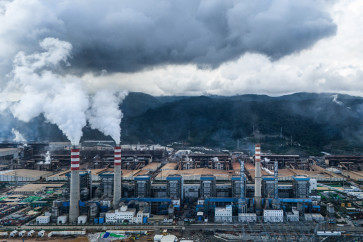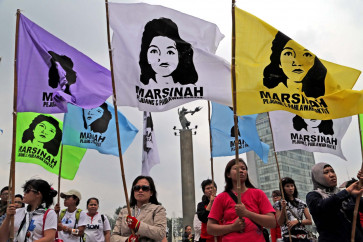Popular Reads
Top Results
Can't find what you're looking for?
View all search resultsPopular Reads
Top Results
Can't find what you're looking for?
View all search resultsAn ‘inconvenient’ lesson from Gore’s ‘Inconvenient Sequel’
Al Gore is angry
Change text size
Gift Premium Articles
to Anyone
A
l Gore is angry. The global climate campaigner and former United States vice president (1993-2001) vented his vexation that President Donald Trump is impeding efforts to deal with climate change.
He also raged at the business interests in league with Trump that are moving backward toward the unrestricted use of fossil fuels: oil, gas and coal.
“In order to fix the climate crisis, we need to first fix the government crisis,” Gore declares. “Our democracy has been hacked,” he adds, given the influence of special interests and following Trump’s June 1 decision to
withdraw the US from the Paris Agreement.
Gore voices his wrath in his new film and book, An Inconvenient Sequel: Truth to Power, the follow-up to his An Inconvenient Truth of 2006 that won him the 2007 Oscar for Best Documentary Film.
Also in 2006, Gore founded the Climate Reality Project, a non-profit that has trained 12,000 climate leaders in 137 countries, including nearly 300 in Indonesia since its establishment.
In the film, Gore airs his vitriol at the new White House tenant by quoting former heavyweight boxing champion Mike Tyson: “You always have a plan until you get punched in the face.”
Gore was referring to Trump’s plan of withdrawing the US from the world agreement reached at the 2015 Paris climate conference that aims for zero carbon emissions by 2050.
Carbon dioxide emissions from fossil fuels as well as forest and peat fires cause global warming.
The film premiered in Jakarta on Aug. 21, at the Epicentrum XXI cinema complex in South Jakarta. Climate Reality Project Indonesia booked the complex’s two theaters for the premiere.
In the documentary, Gore singles out praise for Chile, talking of its commitment to developing the country’s annual renewable energy capacity from megawatts to gigawatts.
He shows a graph in which Chile’s renewable energy target shoots up, aiming for 100 percent renewable energy by 2050.
Another segment of the film sees Gore visiting Georgetown, Texas, population 65,000. Texas is a Republican bastion that voted solidly for Trump in the 2016 presidential election.
The town is run by Republican mayor Dale Ross, but this mayor has climate reality vision. He bucks the Republicans’ core belief in fossil fuels: He is installing solar panels and is out to meet his town’s energy needs entirely by renewable energy.
What can Indonesia learn from An Inconvenient Sequel? Long-term faith in renewable energy.
President Joko “Jokowi” Widodo already has an ambitious energy plan. He wants to generate 35,000 megawatts of new energy capacity by the end of his five-year term in 2019.
However, 20,000 megawatts will be derived from coal and only 2,000 megawatts from renewable energy.
Apparently, well-entrenched interests want fossil fuels to remain dominant in Indonesia’s energy mix.
Rachmat Witoelar, the President’s special envoy on climate change, was asked about Jokowi’s energy plan at an Aug. 24 talk on An Inconvenient Sequel in Jakarta.
What interests want to have more than 50 percent of the country’s energy come from coal, and why can’t renewable energy production go beyond 2,000 megawatts?
Rachmat declined to identify the interests backing continued reliance on fossil fuels, but insisted that the “renewable energy development is on track.”
Meanwhile in the same discussion, Unilever Foundation head Sinta Kaniawati said her multinational consumer goods company was committed to having all its operations use renewable energy by 2030.
Indonesia also has its Nationally Determined Contribution (NDC), the climate action plan to commence in 2020 that all Paris Agreement signatories have drawn up.
Indonesia has targeted a 29 percent cut in carbon emissions from current levels by 2030. Like all Paris Agreement signatories, Indonesia should go beyond its NDC target after 2030 to realize the global goal of zero carbon emissions by 2050.
To get on track toward this goal, the government should have a truly workable climate solution-oriented energy plan.
It should set policies across the board that end the use of fossil fuels as an energy source. It should learn from countries like Chile with a determined zero emissions goal that outlines what they are doing and what challenges they face.
At the local level, the government should incentivize provincial, city and district administrations to develop renewable energy grids using local resources. Solar and wind energy is abundant in tropical Indonesia, not to mention tidal energy in coastal areas.
Incentives, too, in accessible technology and tax breaks should be given to the private sector to develop their own renewable energy plans.
Contests should be held to determine the best working plan. One technology competition should be on how to make renewable energy cheaper than fossil fuels and commercially viable on a large scale.
The major challenge could well be how to convince those parties with capital interests in fossil fuels to switch to clean energy, given that market sentiment is growing for the latter.
All struggles in human history, be they the many nations’ struggle for independence or the end of Apartheid in South Africa, are long fights; so is the climate fight.










